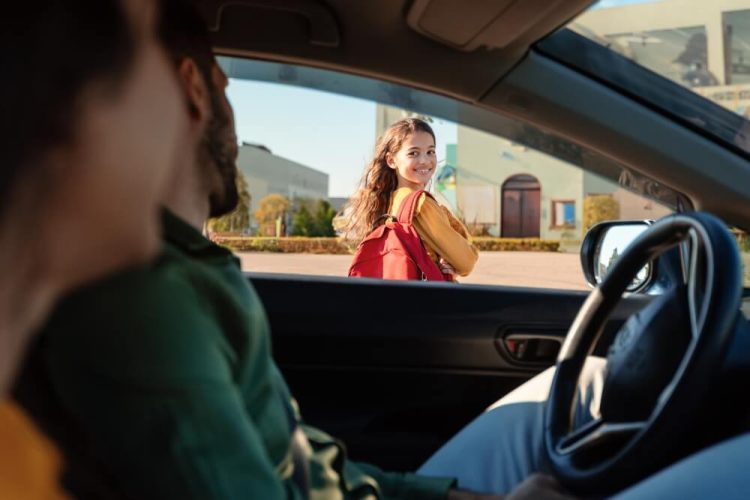
As classes resume, back-to-school traffic kicks in. Parent or not, expect to adjust to shifting driving patterns in your neighborhood. With traffic laws for school zones and the high concentration of cars on the road during drop-off and pick-up times, you could encounter longer commute times, more chances to get a ticket, and even higher chances of getting into an accident.
Those adjustments behind the wheel could even impact your car insurance rate if you don’t plan ahead. By preparing yourself with a few back-to-school driving tips, you can make sure you’re ready for the new traffic landscape.
How School Traffic Affects Driving Habits and Auto Insurance
School season traffic can have a major impact on your driving habits, your commute time, and even your risk of getting into trouble on the road. Because more people are on the roads all at once, things simply get riskier.
Why Back-to-School Traffic Can Lead to More Accidents
School zones are known for being high-risk areas for accidents. Because there are so many people out driving at once, there are more chances for fender-benders. Drivers are also likely to be on their phones coordinating with their kids, leading to texting-and-driving accidents. People rushing to get through congested neighborhoods can also cause issues. Additionally, kids and other pedestrians could also be unknown variables.
The Importance of Adjusting Your Driving Habits for Back-to-School Season
As a driver, it’s your responsibility to respond to conditions on the road. When you encounter extra traffic, you’ll have to follow safe driving habits for parents and stay alert so you can react defensively.
Slowing Down in School Zones: The Key to Avoiding Accidents
First, start by adjusting your speed. School zone restrictions require you to reduce your speed, so it’s important to pay attention to road signs. There may be a flashing light indicating you’re in a restricted zone, or there might just be a sign that details when the lower speed limit applies. Going at a lower speed will give you time to react if someone behaves unpredictably on the road. Just make sure you stay focused and stay off your phone, as you can still get into an accident at lower speeds.
Watching Children and Buses: Safety Tips
You also want to stay alert for kids, buses, and pedestrians. If a bus stops, you also need to stop so kids can safely board and leave the bus. Even when you leave a restricted zone, pay attention to any kids that might be playing or walking near the road.
How School Traffic Can Impact Your Auto Insurance Premiums
These changes don’t just impact your schedule and your commute; they can also affect your wallet. Any change to your risk level on the road could eventually impact how much you pay for insurance.
The Role of Increased Accident Risk in School Zones
Insurance companies use risk profiles to determine how much to charge for your coverage, so auto insurance and driving habits are interlinked. If you’re in an area that has more accidents, you might have to pay a higher premium. This is especially true if you have more accidents on your record than average. If you don’t pay attention, your claims history could raise your costs.
How Traffic Tickets and Accidents Can Raise Your Premiums
Rules are tighter near schools. If you get a ticket or cause a crash in those areas, your insurer will see higher risk and may raise your premium.
Serious violations—speeding in a posted zone, passing a stopped bus, or ignoring a crossing guard—often add points to your license and trigger surcharges.

Tips for Navigating Back-to-School Traffic Safely
Now that you understand how schools in your neighborhood can impact your driving habits, you can take the right steps to keep yourself safe and avoid a rate increase. Here are a few helpful tips to keep in mind.
Plan Your Routes: Avoid School Zones During Peak Hours
When you’re in restricted zones near schools, you’ll have to adhere to temporary speed limits that are much lower than normal. You’ll also have to deal with tons of congestion from parents trying to get to pick-up lines. Whenever possible, it can help to plan a new route that doesn’t go through a restricted zone. By going just a few streets over, you may be able to avoid both increased traffic and slower speed limits.
Use Technology: Apps for Traffic Alerts and School Zone Updates
Modern navigation and GPS apps often have features to help you avoid traffic and other delays. Look for settings to offer updates about high-volume back-to-school traffic and information about speed limit changes in restricted zones.
Be Prepared for Busy Mornings: Allow Extra Time on Your Commute
Traffic increases in the mornings and afternoons as families handle school drop-offs and pick-ups. Expect heavier congestion on your commute—especially if you have kids to drop off. You’ll need extra time to get your kids ready, get them buckled safely into their car seats, and get through the drop-off line.
Even if there aren’t schools in your neighborhood, there may still be more families on the road trying to get their kids to class. Try to give yourself some extra time in the morning to account for the school season. Having an understanding of how rush hour and daily driving can impact your car insurance rates will go a long way to keeping them as low as possible..
How Freeway Insurance Can Help You Stay Safe and Save During the Academic Year
Changes to your daily driving patterns can be tough, especially during weekday school drop-offs and pickups. Stay alert and give yourself a little extra time. Otherwise, you risk costly tickets, collisions, commute delays—and higher insurance rates
While accidents may spike during the academic year, your insurance rates don’t have to. With Freeway Insurance, you get reliable, affordable coverage year-round, so you can drive with confidence and stay protected if you’re in a fender bender. Our bilingual agents are ready to help you find affordable car insurance for any season—call us, get a quote online, or visit one of our offices.
FAQs
It’s important to know exactly how the back-to-school car insurance changes can impact you on the road. Get prepared by reviewing these common questions about tickets, accidents, and auto insurance in school zones.
Will My Auto Insurance Cover Me If I’m Involved in an Accident in a School Zone?
Yes. Being in a school zone doesn’t invalidate your coverage. Claims are handled the same way as anywhere else, subject to your policy and state law. If you’re found at fault, your premium may increase at renewal.
How Badly Will My Auto Insurance Be Affected After an Accident in a School Zone?
It depends on factors like fault, any citations issued (for example, speeding in a school zone), the severity of injuries or property damage, your driving history, and your insurer and state. More serious violations typically lead to larger premium increases. In some states, completing an approved defensive driving course may help mitigate points or qualify you for discounts.
Does Passing a School Bus Cause You to Lose Your License?
Passing a stopped school bus is illegal, and it can cause you to lose your license if you already have a high number of points and infractions on your record. Usually, you’ll just get a hefty ticket and some points on your license, but laws vary from state to state. If you already have a history of serious driving infractions, passing a bus illegally could be the final push that causes your license to get suspended.



